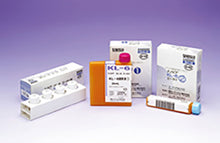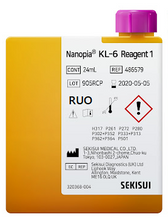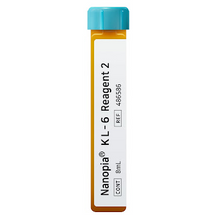Description
The Nanopia® KL-6 Assay, developed and manufactured in Japan by Sekisui Medical Co., Ltd., is a latex agglutination immunoturbidimetric assay for the quantitative measurement of sialylated carbohydrate antigen (KL-6) concentration in serum or plasma.
Krebs von den Lungen 6 (KL-6) is a sialylated carbohydrate antigen that was detected by Kohno et al. in 1985. It is a high molecular weight glycoprotein that is expressed by type II alveolar epithelial cells and is a mucin which belongs to MUC-1 in cluster 9.
KL-6 has been investigated as an important biomarker that is directly associated with the pathogenic process of interstitial lung disease (ILD), reflecting the extent of damage and regeneration of type II pneumocytes. It has been confirmed that the serum KL-6 level is significantly higher in subjects with interstitial pneumonia than in healthy volunteers or subjects with other respiratory diseases, and it has been shown by ROC analysis that serum KL-6 is a diagnostically useful indicator. Serum KL-6 levels may reflect connective tissue disease-associated interstitial lung disease severity.
Type
Immunoturbidimetric assay
Other names
Krebs von den Lungen 6, Sialylated Carbohydrate Antigen, Mucin-1, Mucin 1, MUC-1, MUC1, Breast carcinoma-associated antigen DF3, Cancer antigen 15-3, CA 15-3, Carcinoma-associated mucin, Episialin, H23AG, PEMT, Peanut-reactive urinary mucin, PUM, Polymorphic epithelial mucin, PEM, Tumor-associated epithelial membrane antigen, EMA, Tumor-associated mucin, CD227
Principle of Method
Sialylated carbohydrate antigen KL-6 (KL-6) in samples agglutinates with mouse KL-6 monoclonal antibody coated latex through the antigen-antibody reaction. The change in absorbance caused by this agglutination is measured to determine the KL-6 level.
Sample Types
Serum, Plasma
Sample Volume
2.5 µL
Calibration Range
105.3 - 401.2 U/mL
Dilution Linearity
50-5000 U/mL
Within Run Precision
1.4 %
Documents
- Reagent 1 & 2 product data sheets
- Calibrator product data sheet
- Control data sheet
- MSDS KL-6
- Product Brochure
KL-6 Components Available
Cat. No. Description Size
466175 Nanopia KL-6 Reagent 1 2 x 24 mL
466199 Nanopia KL-6 Reagent 2 2 x 8 mL
536519 Nanopia KL-6 Calibrator Set 1 mL x 4 levels
516214 Nanopia KL-6 Control Set 2 levels, 3 x 1 mL each level
KL6SET Nanopia KL-6 Complete Kit 466175+466199 +536519+516214
References to Summary
- Kohno N. Med J, Hiroshima Univ, 33, 971:1985.
- Kohno N. Respiration, 16, 391:1997.
- Kohno N., et al. Japan J Clin Exper Med, 75, 217:1998.
- Hirasawa et. al. Am J Resp Cell and Mol Biol, 17, 501: 1997.
- Lee, J.S., Lee, E.Y., Ha, YJ. et al. Serum KL-6 levels reflect the severity of interstitial lung disease associated with connective tissue disease. Arthritis Res Ther 21, 58 (2019). https://doi.org/10.1186/s13075-019-1835-9
Resources
Want to learn more about KL-6? We have compiled the links below which contain information that you may find interesting:
- UniProt Knowledgebase: UniProtKB - P15941 (MUC1_HUMAN): Mucin-1
- PubChem Gene Summary: MUC1 - mucin 1, cell surface associated (human)
- PubChem Protein Summary: Mucin-1
- Scotto, Riccardo et al. “Serum KL-6 Could Represent a Reliable Indicator of Unfavourable Outcome in Patients with COVID-19 Pneumonia.” International journal of environmental research and public health vol. 18,4 2078. 20 Feb. 2021, doi:10.3390/ijerph18042078
- Kondo, Tomohiro et al. “KL-6 concentration in pulmonary epithelial lining fluid is a useful prognostic indicator in patients with acute respiratory distress syndrome.” Respiratory research vol. 12,1 32. 22 Mar. 2011, doi:10.1186/1465-9921-12-32






